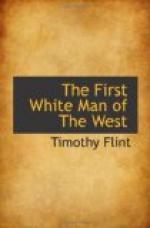We wish to present him in his strong incipient manifestations of the development of his peculiar character in boyhood. We then see him on foot and alone, with no companion but his dog, and no friend but his rifle, making his way over trackless and unnamed mountains, and immeasurable forests, until he explores the flowering wilderness of Kentucky. Already familiar, by his own peculiar intuition, with the Indian character, we see him casting his keen and searching glance around, as the ancient woods rung with the first strokes of his axe, and pausing from time to time to see if the echoes have startled the red men, or the wild beasts from their lair. We trace him through all the succeeding explorations of the Bloody Ground, and of Tennessee, until so many immigrants have followed in his steps, that he finds his privacy too strongly pressed upon; until he finds the buts and bounds of legal tenures restraining his free thoughts, and impelling him to the distant and unsettled shores of the Missouri, to seek range and solitude anew. We see him there, his eyes beginning to grow dim with the influence of seventy winters—as he can no longer take the unerring aim of his rifle—casting wistful looks in the direction of the Rocky Mountains and the western sea; and sadly reminded that man has but one short life, in which to wander.
No book can be imagined more interesting than would have been the personal narrative of such a man, written by himself. What a new pattern of the heart he might have presented! But, unfortunately, he does not seem to have dreamed of the chance that his adventures would go down to posterity in the form of recorded biography. We suspect that he rather eschewed books, parchment deeds, and clerkly contrivances, as forms of evil; and held the dead letter of little consequence. His associates were as little likely to preserve any records, but those of memory, of the daily incidents and exploits, which indicate character and assume high interest, when they relate to a person like the subject of this narrative. These hunters, unerring in their aim to prostrate the buffalo on his plain, or to bring down the geese and swans from the clouds, thought little of any other use of the gray goose quill, than its market value.
Had it been otherwise, and had these men themselves furnished the materials of this narrative, we have no fear that it would go down to futurity, a more enduring monument to these pioneers and hunters, than the granite columns reared by our eastern brethren, amidst assembled thousands, with magnificent array, and oratory, and songs, to the memory of their forefathers. Ours would be the record of human nature speaking to human nature in simplicity and truth, in a language always impressive, and always understood. Their pictures of their own felt sufficiency to themselves, under the pressure of exposure and want; of danger, wounds, and captivity; of reciprocal kindness, warm from the heart; of noble forgetfulness of self, unshrinking firmness, calm endurance, and reckless bravery, would be sure to move in the hearts of their readers strings which never fail to vibrate to the touch.




